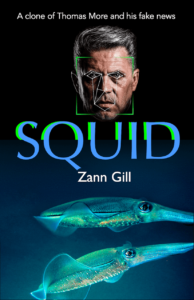

BOOK TALK AND PODCAST DISCUSSION TOPICS
SQUID. A genetic engineering breakthrough makes it possible to clone a human.
Thomas More, author of the best-selling hoax, Utopia, is selected to clone.
As Tom Evermore five hundred years later, Thomas More’s clone deceives the public via fake news – an alien conspiracy code-named SQUID [Security Questions: Unidentified Intrusions & Disappearances] using techno-wizardry to steal secrets from our ocean. Like his twin, Thomas More, it’s deceit for a good cause.
What are the
- parallels between Minority Report and SQUID twenty+ years later?
- two points of view on fake news in SQUID?
- human civil liberties and rights to privacy issues in SQUID?
- threats to our ocean evoked by the story of SQUID?
- risks if virtual reality and the metaverse are developed instead of making saving the real ocean our top priority?
Questions:
1. What do you see as the urgent message of SQUID for today?
2. What was your biggest surprise in writing the book SQUID?
3. SQUID is black satire. How was writing this story uplifting for you?
4. How do you, and your invited chapter authors, believe that SQUID can empower change-makers committed to address climate change, and saving our ocean?
![]()
SQUID invited chapter authors:
Science fiction allows us to comment on future innovation and risks:
I first wrote SQUID as a screenplay in which grand challenges converge into a story: saving our ocean lifeline, the cornerstone for all life on Earth; implications of climate change for ocean futures; tendency of the masses to carry on like zombies “business as usual,” the question those who care about saving our ocean are asking, “What will it take to wake people up?”
Questions:
- How does SQUID enable us to look at the present through another lens?
- How do you see story-telling as a powerful lens to shed light on problems that would be polarizing if debated from facts?
- How is story-telling like designing a puzzle to highlight problems that we do not want to face today?
- How would you, and your invited chapter authors, ideally like for these podcasts, book talks and discussions to spark next steps that have impact?
More on Zann Gill. For reviewer copies of the book, see press release and contact Alex Young-Davis.




